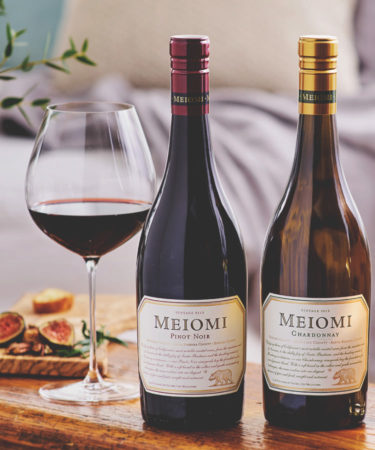Among a pantheon of seemingly overnight, 21st-century sensations (Cardi B, Instant Pot) lies Meiomi, a 12-year-old California label with $315 million in the bank.
Boosted by chart-topping national appetites for Pinot Noir, Meiomi is now a wildly popular label with its fair share of detractors. Love it or hate it, you should know about it. Here are nine things to learn about the Central Coast’s Meiomi Wines.
Some family meals have $315 million on the table.
Joe Wagner developed Meiomi in 2006 while he was working for his father, Chuck, at Caymus Vineyards, the Cabernet-centric winery founded by Joe’s grandfather. Joe was 33 years old when he sold Meiomi to Constellation Brands for $315 million in July 2015, less than 10 years after its founding. “We are on the same page,” Joe told Wine Spectator about his relationship with his father, but allowed that Meiomi’s meteoric success did, at one point, complicate their father-son, boss-employee dynamic.
Don't Miss A Drop
Get the latest in beer, wine, and cocktail culture sent straight to your inbox.Before there was Napa, there was Meiomi.
According to Wagner, Meiomi means “coastal” in Wappo, the language spoken by the indigenous people of Northern California. Wappo is also the name of their tribe.
Have you thanked a grandmother today?
Meiomi was born from Belle Glos, a single-vineyard Pinot Noir label named for his grandmother, Lorna Belle Glose. Today, Belle Glos Clark and Telephone Pinot Noir retails for $50 a bottle and rakes in top rankings.
Wagner is a genius. He was in the right place at the right time. Stop, you’re both right.
On the one hand, Wagner created a label that is accessible and reliable. It offers bright, berry-rich sweetness, which Americans historically love, plus balance and food-friendliness. That said, Wagner happened to bottle an affordable California Pinot Noir at exactly the time when everyone in America wanted affordable California Pinot Noirs.
He maybe owes Thomas Haden Church a drink.
“Sideways,” the 2004 film in which two middle-aged white guys drink wine and reevaluate life against a picturesque backdrop of the Santa Ynez Valley’s rolling hills, made California Pinot Noir a national obsession. Launched in 2006, Meiomi sold 90,000 cases by 2010 — not bad for a label less than five years old. But by 2015, Meiomi sold 700,000 cases annually. “Nobody cared about Pinot Noir [before ‘Sideways’],” Wagner said. “After its release, all bets were off and you couldn’t make enough Pinot. [It] changed the dynamics of the industry for Pinot Noir.”
If you like sunshine and puppies, you’ll probably like Meiomi.
Meiomi’s Pinot Noir is easy-drinking, with Bing cherries and other red fruit for sweetness, plus a healthy oak balance and very palatable price point (the 2016 retails for $24.99). It regularly wins over haters — as in this Corkscrew Report review, which convincingly compares Meiomi’s undeniable runaway commercial success to the “Fast and Furious” franchise, and calls its 2015 Pinot Noir “the kind of wine we’re prepared to hate from the outset, but we’ll be damned, it’s such a likable and pleasant Pinot that’s so easy to drink we can’t even pretend to write it off.”
Conventionally handsome twins who know a lot about cheese also love Meiomi.
Charlie and Michael Kalish, known to Food Network fans as the “Cheese Twins,” won the seventh season of that network’s Great Food Truck Race by devoting themselves to portable grilled cheeses. Now, in addition to their cheese consulting business (cough: dream job), the twins are Meiomi brand ambassadors, giving tips and pairing advice to everyone from Martha Stewart to the Dallas Morning News.
It might just be the brightest constellation in the sky.
How successful is Meiomi? Its parent company, Constellation Brands, reported $35.3 million in sales of Meiomi in its first three months, according to figures shared by Decanter. Meiomi reportedly constituted close to two-thirds of its parent company’s 8 percent annual growth in wine and spirits.
There’s more to Meiomi than Pinot.
Meiomi’s Pinot Noir may have launched a thousand ships, but the company also bottles a rosé and a Chardonnay. The latter was a silver medalist at the 2017 San Francisco Chronicle Wine Competition and has notes of citrus, baking spices, and butterscotch on the nose, followed by a clean palate and slight minerality. Meiomi’s rosé is of the mineral-driven, ballet-pink variety, with fruity aromas and a dry finish.
